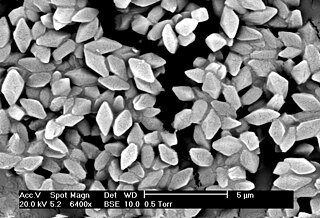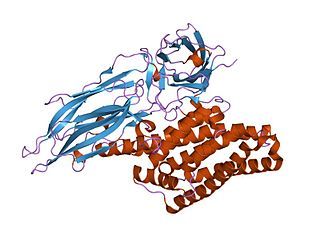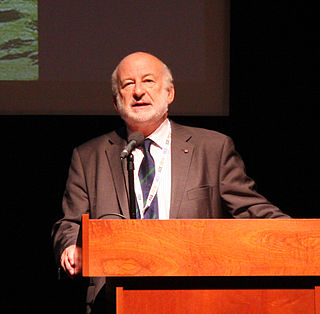Related Research Articles

Bacillus thuringiensis is a gram-positive, soil-dwelling bacterium, the most commonly used biological pesticide worldwide. B. thuringiensis also occurs naturally in the gut of caterpillars of various types of moths and butterflies, as well on leaf surfaces, aquatic environments, animal feces, insect-rich environments, and flour mills and grain-storage facilities. It has also been observed to parasitize other moths such as Cadra calidella—in laboratory experiments working with C. calidella, many of the moths were diseased due to this parasite.

Insecticides are substances used to kill insects. They include ovicides and larvicides used against insect eggs and larvae, respectively. Insecticides are used in agriculture, medicine, industry and by consumers. Insecticides are claimed to be a major factor behind the increase in the 20th-century's agricultural productivity. Nearly all insecticides have the potential to significantly alter ecosystems; many are toxic to humans and/or animals; some become concentrated as they spread along the food chain.

Rothamsted Research, previously known as the Rothamsted Experimental Station and then the Institute of Arable Crops Research, is one of the oldest agricultural research institutions in the world, having been founded in 1843. It is located at Harpenden in the English county of Hertfordshire and is a registered charity under English law.

Pesticide resistance describes the decreased susceptibility of a pest population to a pesticide that was previously effective at controlling the pest. Pest species evolve pesticide resistance via natural selection: the most resistant specimens survive and pass on their acquired heritable changes traits to their offspring. If a pest has resistance then the pesticide lacks efficacy – efficacy and resistance are inversely related.
Sir Thomas Richard Edmund SouthwoodGOM DL FRS was a British biologist, Professor of Zoology and Vice-Chancellor of the University of Oxford. A specialist on entomology, he developed the field of insect ecology and the development of study techniques. He wrote a landmark textbook on Ecological Methods that went into numerous editions. He also was well known for developing the field of entomology through mentorship of a circle of researchers at Silwood Park.

Eleanor Anne Ormerod was a pioneer English entomologist. Based on her studies in agriculture, she became one of the first to define the field of agricultural entomology. She published an influential series of articles on useful insects and pests in the Gardeners' Chronicle and the Agricultural Gazette along with annual reports from 1877 to 1900. These annual reports were produced by summarizing information provided by her network of correspondents from across Britain. Belonging to the landed gentry, she worked as an honorary consulting entomologist with the Royal Agricultural Society of England and received no pay for any of her work. She also promoted the use of paris green as an insecticide and called for the extermination of the house sparrow.

Margaret Ann Boden is a Research Professor of Cognitive Science in the Department of Informatics at the University of Sussex, where her work embraces the fields of artificial intelligence, psychology, philosophy, and cognitive and computer science.
Sir Michael John Berridge was a British physiologist and biochemist.
Raymond J. St. Leger is an American mycologist, entomologist, molecular biologist and biotechnologist who currently holds the rank of Distinguished University Professor in the Department of Entomology at the University of Maryland, College Park.

Delta endotoxins (δ-endotoxins) are pore-forming toxins produced by Bacillus thuringiensis species of bacteria. They are useful for their insecticidal action and are the primary toxin produced by Bt maize/corn. During spore formation the bacteria produce crystals of such proteins that are also known as parasporal bodies, next to the endospores; as a result some members are known as a parasporin. The Cyt (cytolytic) toxin group is a group of delta-endotoxins different from the Cry group.
Patricia "Pat" Simpson FRS is a distinguished British developmental biologist. Simpson was a professor of Comparative Biology at the University of Cambridge from 2003 to 2010, and was the University's Director of Research for the academic year 2010/2011. She is currently an Emeritus Professor of the Department of Zoology of the University of Cambridge, having previously been Professor of Comparative Embryology, and a Fellow of Newnham College. She was elected a Fellow of the Royal Society in 2000.

Myzus persicae, known as the green peach aphid, greenfly, or the peach-potato aphid, is a small green aphid belonging to the order Hemiptera. It is the most significant aphid pest of peach trees, causing decreased growth, shrivelling of the leaves and the death of various tissues. It also acts as a vector for the transport of plant viruses such as cucumber mosaic virus (CMV), potato virus Y (PVY) and tobacco etch virus (TEV). Potato virus Y and potato leafroll virus can be passed to members of the nightshade/potato family (Solanaceae), and various mosaic viruses to many other food crops.

John Anthony Pickett CBE DSC FRS is a British chemist who is noted for his work on insect pheromones. Pickett is Professor of Biological Chemistry in the School of Chemistry at Cardiff University. He previously served as the Michael Elliott Distinguished Research Fellow at Rothamsted Research.
P. Ananda Kumar is an Indian plant molecular biologist and biotechnologist.

Hugh David Loxdale is an entomologist. He was professor of ecology at the Institute of Ecology, University of Jena from 2009 to 2010, president of the Royal Entomological Society from 2004 to 2006, and honorary visiting professor at the School of Biosciences, Cardiff University. Loxdale works on the population biology, ecology, and genetics of insects, especially aphids and their wasp parasitoids.

Janet Hemingway is a British infectious diseases specialist. She is the former Director of Liverpool School of Tropical Medicine (LSTM) and founding Director of iiCON: Infection Innovation Consortium and Professor of Tropical Medicine at LSTM. She is current President of the Royal Society of Tropical Medicine and Hygiene.
Angharad M. R. Gatehouse is an entomologist in the UK. Gatehouse is Professor of Invertebrate Molecular Biology at Newcastle University, is on the Council of the International Congress of Entomology, and is the Director of Expertise for BioEconomy.
Karim Vahed FRES is a British entomologist. He is a professor of entomology and senior lecturer in biological sciences at the University of Derby, and is an expert in crickets and bushcrickets (katydids).
Beulah Garner FRES is an entomologist in the United Kingdom. She is Senior Curator at the Natural History Museum, London and is an expert of beetles, in particular the ground beetles (Carabidae).
Baldwyn Torto is a Ghanaian scientist. He is a Chemical ecologist, and a Principal Scientist at the International Centre of Insect Physiology and Ecology (ICIPE). He also doubles as an extraordinary professor and the head of Behavioural and Chemical Ecology Unit, Department of Zoology and Entomology at the University of Pretoria, South Africa. He is a fellow of the Entomological Society of America, a fellow of the African Academy of Sciences, and a member of the American Chemical Society.
References
- ↑ "Staff directory - Rothamsted Research". www.rothamsted.ac.uk. Retrieved 19 February 2018.
- ↑ "Biointeractions and Crop Protection - Rothamsted Research". www.rothamsted.ac.uk. Retrieved 19 February 2018.
- 1 2 3 4 5 "Linda Field". Rothamsted Research. Retrieved 29 October 2020.
- ↑ "Draft:Linda Field", Wikipedia, 2 July 2020, retrieved 29 October 2020
- ↑ Roy, Prof Helen Elizabeth (3 June 2020). "Celebrating and promoting the science of entomology". UK Centre for Ecology & Hydrology. Retrieved 29 October 2020.